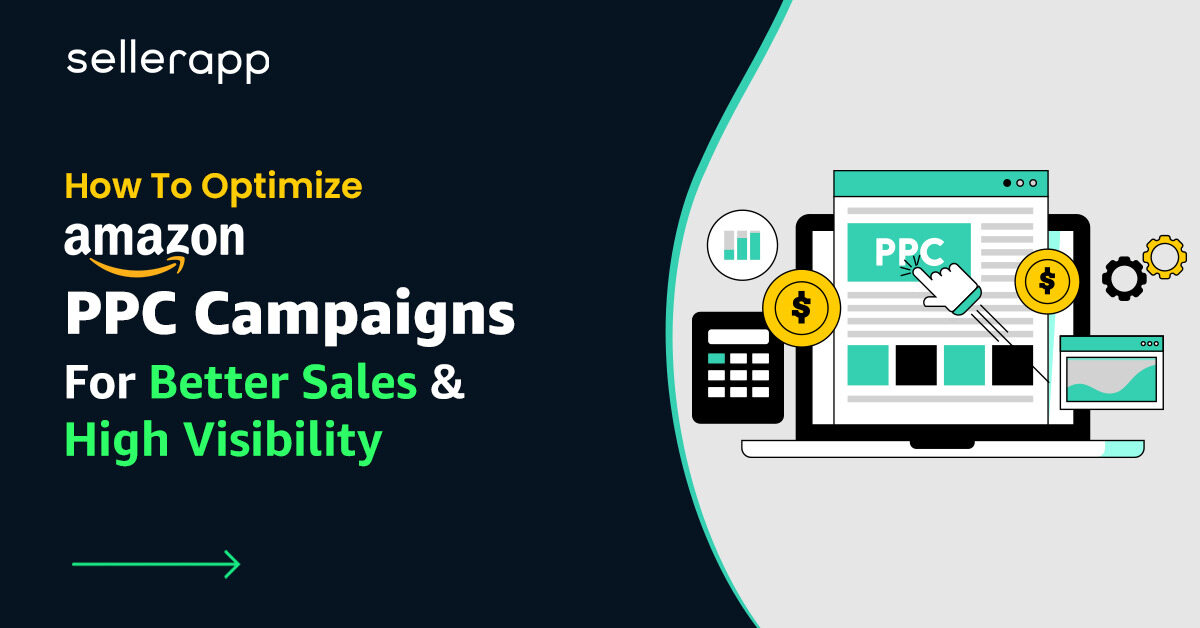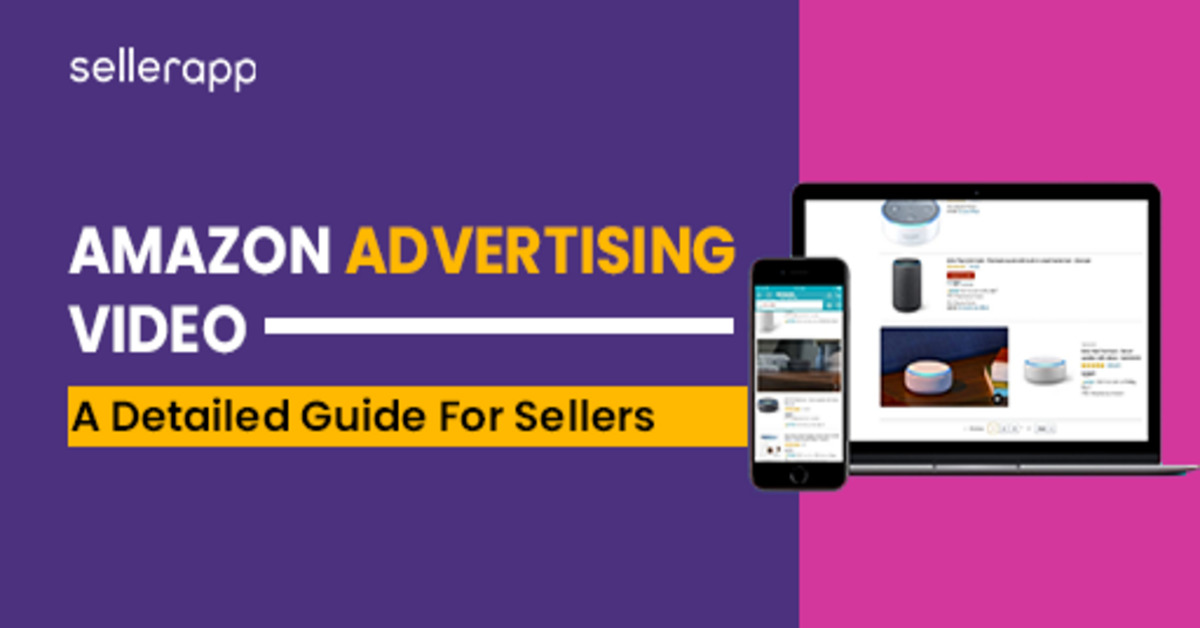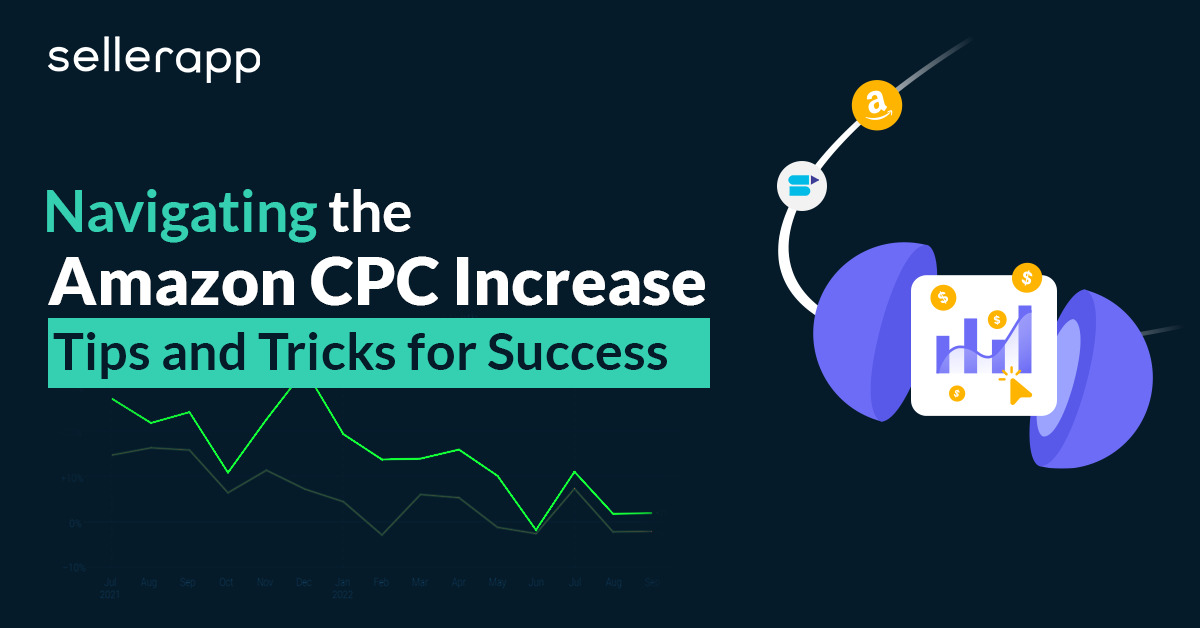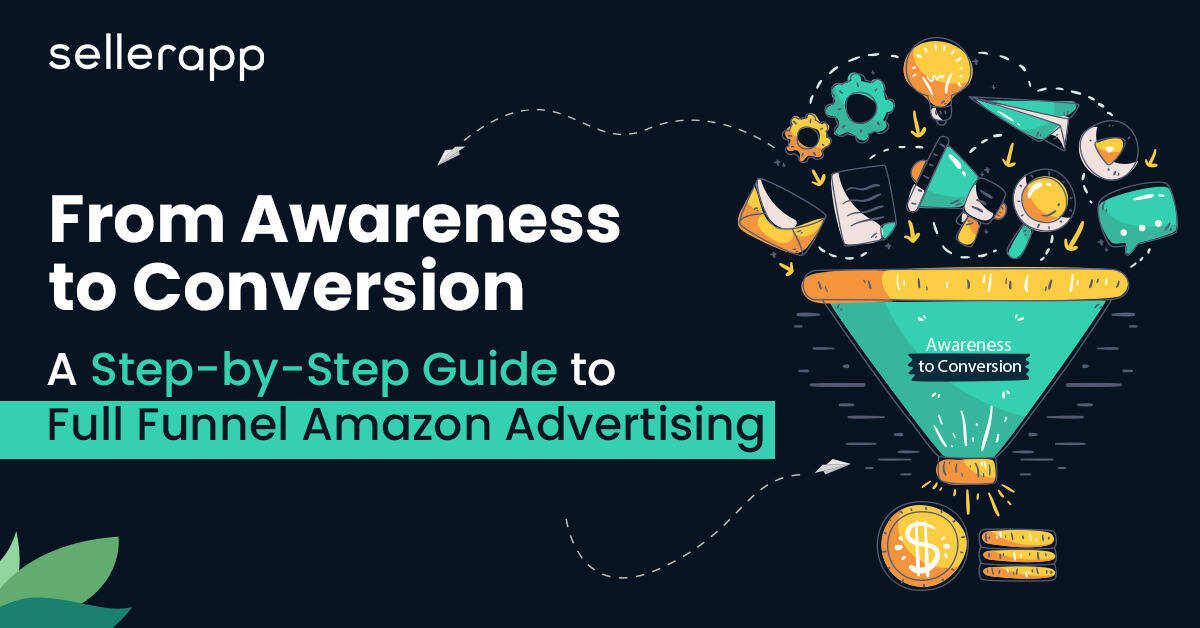Amazon Audio Ads: Transform your Advertising From Boring to Engaging

With a whopping 55 million users, Amazon Music is the world’s leading music streaming platform.
And it provides e-commerce brands and sellers a unique opportunity to connect with their audience through a new and immersing ad format.
Amazon ads are short, and engaging and let brands connect with the target audience with interactive commands.
This article will explain everything you need to know about Amazon Audio ads and how to use them to grow your business.
Let’s jump into it.
Here is a quick peek into the article:
- What are Amazon Audio Ads?
- Why should you use Amazon Audio Ads?
- How do Amazon audio ads engage consumers?
- How to set up Amazon Audio Ads?
- Which audio ad length is right for your campaign?
- Tips for creating compelling Amazon Audio Ads
- How to track Amazon Audio Ad’s success?
- Final thoughts
What are Amazon Audio Ads?
You can think of Amazon audio ads as radio commercials, but for Amazon Music and other third-party Amazon publisher services, including desktop, mobile, tablet, connected TV, and smart speakers devices (e.g., Echo, third-party Alexa-enabled devices, and Fire TV).
They are usually 10-30 seconds short and used to promote products and improve brand awareness. Audio ads can also be interactive, allowing listeners to take action with voice commands.
Note: The best part of audio ads is Amazon charges for these audio ads on a cost-per-thousand-impressions basis, which means sellers pay for every 1000 views on the audio ads.
Why should you use Amazon Audio Ads?
Audio streaming has become increasingly popular since the advent of the internet, growing by a whopping 64% since 2014. Experts predict that this growth will continue, with user penetration set to increase to 14.1% by 2027.
Furthermore, with over 100 million active podcast listeners projected by 2023, brands can use amazon audio ads to connect with their target audience.
Here are some reasons to use audio ads in your campaign.
Audio advertising is widespread.
With 41% of American households having an audio device, Amazon audio ads have deep penetration into US consumers’ households.
Not only that, Amazon audio ads can run in various ad-supported locations, including music and news streams. These are also programmatic, making it easier to feature in various placements and reach a wider audience.
Audio listeners give the most attention.
Audio listeners are highly attentive and responsive to advertising on smart devices. Specifically, 38% of Alexa users reported paying more attention to ads while consuming content, indicating a significant potential for effective advertising through this medium.
Furthermore, among Amazon’s connected audio consumers, 29% make online purchases, significantly higher than the general population (18%). This suggests that ad-supported audio can be an effective means of persuasion for consumers to buy products.
Consumers are getting more screen-aware
As consumers become increasingly screen-aware and seek more screenless experiences, audio ads emerge as a highly effective advertising medium.
It enables businesses to reach a wider audience through Amazon Music and other 3rd party music streaming services. With the average American spending around 32 hours a week listening to music, there’s ample opportunity to capture their attention and convert them into customers.
Audio ads are interactive.
Audio advertising can be interactive, allowing customers to interact directly with brands. For example, with Alexa, customers can add the advertised product to a cart with voice commands. It allows brands to engage with the audience and increase conversions effectively.
How do Amazon audio ads engage consumers?
As digital advertising continues evolving, brands constantly seek innovative ways to connect with consumers. With Amazon’s wealth of consumer data, brands can use Amazon audio ads to target audiences based on demographic composition, lifestyle, music genre preferences, or in-market shopping signals.
By combining demographic and behavioral signals, Amazon audio ads can bring in a 50% higher branded search rate than just targeting demographic audiences alone.
But how do brands keep listeners engaged after showing the audio ads?
The answer is voice call-to-actions. Around 39% of Amazon-connected audio customers said they are more likely to respond to audio ads if it has voice call-to-action.
With interactive Amazon audio ads, customers can take action with voice commands. For example, they can give commands like “Add to cart,” “Send more information,” or “Remind me,” and Alexa will execute the command, making the shopping experience frictionless for the customers.
Not just that, with Amazon Publisher Services(APS), sellers can get additional reach on premium, third-party streaming services and engage the shoppers there.
How to set up Amazon Audio Ads?
Now that you know what are amazon audio ads and why they are important, let’s learn how to set them up.
Understand your advertising goals.
Start by identifying your advertising objectives. Are you aiming to increase brand awareness, launch a new product, or drive sales? Knowing your goals will help you develop a compelling audio script and create visuals that align with your objectives.
Connect with an Amazon Ad Consultant.
Since Amazon audio ads come under DSP or Demand Side Platform, you need first connect with an Amazon ad consultant from here.
Note: Amazon audio ads are currently only available in the United States, Denmark, Italy, and the United Kingdom. And you need to have a monthly advertising budget of over $15,000 to be eligible to run them.
Submit the audio file and banner creative.
Once Amazon verifies your business, they’ll give you access to the DSP console, where you must submit the audio file and banner creatives for your ad. Make sure to follow the given guidelines and requirements.
Audio file requirements
- The length should be between 10 – 30 seconds
- File size shouldn’t exceed 1MB
- The audio file format should be WAV, MP3, or OGG
- And last but not least, the volume should be 192 kbps RMS normalized to -14 dBFS Peak normalized to -0.2 dBFS
Additional guidelines:
Apart from the basic requirements, here are some additional guidelines:
- Ensure to avoid violent, threatening, suggestive, or provocative content in the audio ads.
- Use your own custom branding on the ads, and avoid using Amazon branding elements, unless Amazon approves it.
- Voiceovers, dialogue, and disclosures should be easy to hear and understand, with even pacing and appropriate loudness.
- Avoid abrupt or startling sound cuts at the start and end of the ad.
- Since these are audio ads, avoid adding references to click-through actions.
- Avoid making unsubstantiated marketing claims or elaborate jokes or skits.
- Music and sound effects can be used as narrative elements to help tell a story or emphasize a message. However, avoid using shrill or jarring sounds like air horns.
- The ads might play after one another. So avoid introductory statements that presume a situation. For example:
- Do: “Hey, listener!”
- Avoid: “Sorry for interrupting your music!”
- Avoid: “Brought to you by [brand/product name].”
- End the audio ads with a clear CTA. And it must be aligned with your advertising goals (e.g., building awareness, driving sales, product launch)
Recommended read: Types Of Data Available In Amazon Marketing Stream.
Companion banner
It’s the creative that shows up on the screen when the ad is playing.
Companion Banner requirements:
- The creative dimension should be set to 1024 x 1024 pixels
- The minimum file size should be 750kb
- The image format should be JPEG, JPG, or PNG
- The image should contain a click-through link (only available for desktop, mobile, and tablet)
- The ad heading should be within 19 characters and include the brand name and/or advertised product.
- Avoid including calls to action (CTAs) or styling ad copy to resemble a tappable user interface

For interactive audio ads, include the Alexa-branded speech bubble using the appropriate font and styles. (e.g., “Alexa, add to cart”).

If the ad contains URLs, it should be a small 1-line text with less than 50 characters.

- Keep the ad copy short and crisp, with 12 words maximum, excluding brand name, logo, and legal texts like copyright information.
- The minimum font size should be 32pt to ensure maximum readability on mobile.
Interactive audio ad requirements for different CTAs
Along with the standard audio ad requirements, sellers must provide additional information based on different CTAs on the ad.
“Add to cart” CTA
Sellers need to provide the AISN to be added to the cart. However, certain ASIN types are not currently supported. Like:
- Prime Pantry
- Subscriptions
- Customizable products, such as t-shirt sizes, subscription option
- Grocery and consumable products from subsidiaries, such as Whole Foods and Prime Now
- Video and e-gift cards
- In-skill purchasing products
- Age-restricted products, such as alcohol or explicit content
- Non-US ASINs
“Remind me” CTA
For the “Remind me” CTA, provide the following details:
- Reminder date and time (must be between 9 am to 8 pm)
- Reminder text (must be under 120 characters. Amazon recommends keeping it under 38 characters)
When the reminder is triggered, the audio device will read the reminder text aloud, and a push notification will be sent to the Alexa app.
“Send more info” CTA
For the “Send more info” CTA, the requirements are:
- The click-through URL of the product listing page
- Brand name
When customers interact with the ad by saying, “Alexa, send me more info,” Amazon sends them an email containing the click-through URL and brand name.
Note: Interactive ads are only available in the USA.
Which audio ad length is right for your campaign?
Even if an Amazon audio ad can run between 10-30 seconds, you can segregate the ads into two different groups.
- 10 – 20 seconds short videos
- 21 – 30 seconds long videos
Shorter ads are great for bringing awareness
Short audio ads are great for driving top-funnel growth, such as bringing more visibility and traffic to your product.
In fact, people tend to remember shorter ads better than longer ones. Studies have shown that ads between 10-20 seconds have 75% better ad recall than longer ads.
Not only that, but shorter ads also build better brand loyalty. People who listen to short audio ads have a 71% greater average brand favorability than those who listen to longer ads.
Longer ads are excellent for driving consideration
On the other hand, If your goal is to improve mid-funnel metrics for your campaigns, longer ad lengths may be the way to go. Studies have shown that audio ads lasting 20 seconds or more can drive greater consideration for your product, with detail page views increasing by an average of 86% compared to shorter ads.
In the end, there are multiple other aspects to consider while choosing the Amazon audio ad length, such as campaign goal, target audience, seasonality, and more.
Tips for creating compelling Amazon Audio Ads
However, ad length is just one piece of the puzzle. You need to keep in mind some other tips for creating compelling audio ads. Such as,
Create a compelling script.
Crafting a persuasive and engaging script for Amazon audio ads is essential for the success of your advertising campaign. While it may seem complicated, here are some tips for creating a great Amazon audio ad script:
- Use simple, concise statements to convey your message effectively. Short sentences that pack a punch are ideal for capturing your audience’s attention and keeping them engaged.
- Use the language of your target audience. Avoid overly formal language or industry jargons that can throw off the listeners.
- Avoid cramming too much information into a single ad. Stick to a single, compelling message that resonates with listeners and drives them to purchase.
Highlight your product USPs.
Your Amazon audio ad must stand out among millions of competitors to generate desired sales. Here are some tips for doing that:
Focus on the edge:
Your product’s unique selling point can be anything, from superior quality, unique features, or affordable pricing. Make sure to highlight the USP in your Amazon audio ad. It helps you grab customers’ attention and differentiate yourself from the competition.
For instance, if you’re selling headphones, you could focus on noise-cancellation technology as your USP. Or, mention how your headphones are the most comfortable to wear for a long time, allowing users to enjoy their music without any ear pain.
Mention exclusive offers and promotions:
Customers love to feel like they’re getting a good deal, so highlighting any special offers could push them to choose your product over the competition.
For example, mention if you’re offering a limited-time discount for first-time buyers offer in the ad.
Avoid testimonials:
Testimonials can throw off the listeners in a short Amazon audio ad with so many voices. Avoid these, and focus on the product USP and exclusive deals.
Provide a top-notch recording.
Even if you create a killer ad script, if it sounds unclear, nobody will listen to it.
To deliver your message effectively to your audience, you must create a recording that is crisp, clear, and free from interference.
Here are two tips to help you create a top-notch recording for your Amazon audio ad:
Speak in a clear voice:
When recording, ensure you speak clearly and at a moderate pace. This will enable your audience to follow your message without feeling overwhelmed or bored.
Minimize Interference:
Invest in a good quality microphone and soundproof your recording area to ensure zero background noise in your audio ads. You can also use editing software to remove unwanted noise from your recording.
Avoid sound effects & use smooth transitions.
Using excessive sound effects can be a major turn-off for the audience and cost you potential sales.
While sound effects can be useful in certain situations, using them sparingly and only when they serve a specific purpose is important.
For example, add a subtle sound effect to emphasize a key point in your ad. But avoid using multiple sound effects throughout your ad. It can quickly become overwhelming and distracting.
Additionally, avoid starting your ad with a long pause. Remember, Amazon audio ads are generally played in between songs or other ads.
Starting with a long pause or an apology for interrupting songs may cause listeners to tune out before your message even begins.
Instead, focus on creating a smooth transition that seamlessly blends into the listener’s experience.
For example, you can use a catchy opening phrase, incorporate music that is similar to the genre the target audience listens to, or start your message with a confident and engaging tone.
Keep a consistent brand voice.
Consistency is key to building a strong and recognizable brand. Consumers should be able to identify your brand easily, regardless of the platform they encounter it on.
Even according to a study by Forbes, brands can improve revenue by 23% if they keep cross-platform consistency in their messaging.
But how can you keep your brand voice consistent in your Amazon audio ads?
While creating your Amazon audio ads, ensure to use the same tone, language, and messaging that you use across all platforms.
For example, if your brand voice is friendly and conversational, ensure your audio ad reflects that tone. On the other hand, if your brand is more formal and professional, your audio ad should reflect that as well.
Finally, regularly test and refine your audio ads to ensure they resonate with your target audience and optimize them to maximize conversion.
How to track Amazon Audio Ad’s success?
If you’re using Amazon Audio Ads to promote your products, it’s important to measure their performance to gauge their success. Luckily, Amazon provides a range of metrics to help you do just that.
Here are three key metrics to track when analyzing the effectiveness of your Amazon Audio Ads:
- Impressions: Impressions measure the number of times your ad was played. It gives you an idea of how many people your ad reached.
- Listen-through rate (LTR): LTR is the percentage of times your audience listened to your ad to the end. It tells you how engaged your audience is with your ad.
- Purchase intent: Purchase intent is the number of audiences who’ve shown interest in purchasing your product after listening to your ad. It is a valuable metric to measure the effectiveness of your ad in driving sales.
For example, let’s say you launched an Amazon Audio ad to promote new wireless earbuds. You noticed that your ad received a high LTR but a low purchase intent rate.
This means that people were interested in your ad but didn’t find your ad compelling enough to purchase. In this case, optimize your ad’s messaging or tweak the CTA to increase purchase intent.
Amazon’s metrics and reporting console also provide different other important metrics to optimize your audio ad campaigns.
Recommended read: How can you effectively analyze Amazon Data over time?
Final Thoughts
Amazon Audio ads are a powerful tool for businesses looking to create a full-funnel advertising strategy, reach a wider audience and drive more sales.
With unique brand tone and creative messaging, interactive Amazon audio ads can get into the hearts of target customers.
But if you’re uncertain about implementing Amazon Audio ads for your business, no need to worry.
SellerApp’s team of PPC experts has helped over 20,000 sellers, and e-commerce brands create comprehensive advertising strategies that deliver unparalleled success.
So why not take advantage of our expertise and take your business to the next level?
Contact us today, and learn how we can help you create a winning advertising strategy that maximizes your ROI and drives high CTR.
With SellerApp, the possibilities are endless!
Additional read:
what are the New modules that are available on Amazon A++ content











Harry
March 23, 2023SellerApp’s blog on Amazon audio ads is a great resource for businesses looking to tap into this advertising channel.
Arishekar N
March 27, 2023Thank you Harry.
Charlie
March 23, 2023This blog is a must-read for any business looking to expand its advertising reach and drive more sales on Amazon.
Arishekar N
March 27, 2023Thank you for your feedback Charlie